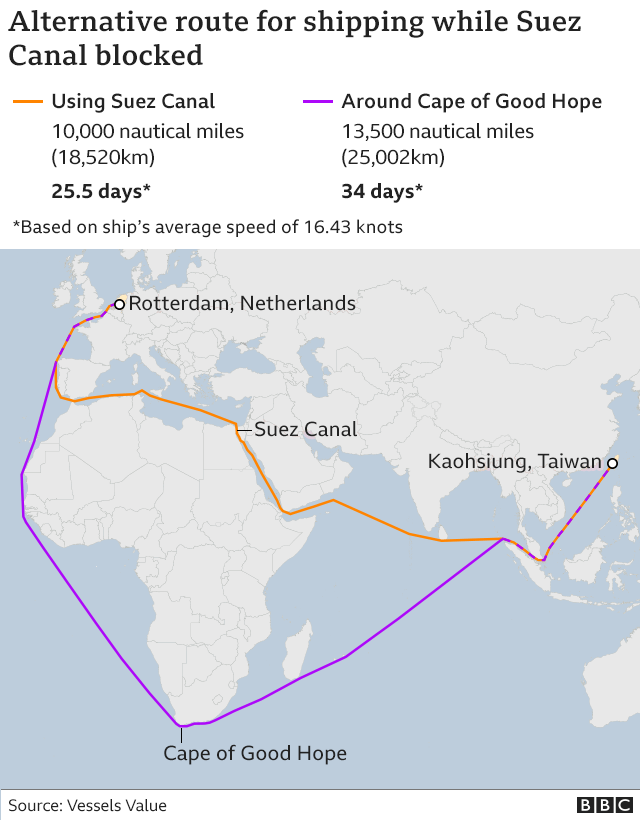A fresh effort is under way to refloat a giant container ship blocking Egypt's Suez Canal.
Canal authorities say 14 tugboats are trying to take advantage of Saturday's high tide and more will arrive on Sunday if the latest attempt fails.
The Ever Given became wedged in the canal - one of the world's busiest trade channels - on Tuesday.
More than 300 ships are stuck on either side of the blockage. Some have had to reroute around Africa.
By late Friday, dredgers had moved about 20,000 tonnes of sand from around the Ever Given's bow, which was stuck deep into the canal's bank.
The chairman of the Suez Canal Authority (SCA), Osama Rabie, told a news conference on Saturday that 9,000 tonnes of ballast water - which is stored in tanks to stabilise the ship - had been removed to help lighten the vessel.
He said the stern had begun to move on Friday night, and that the rudder and propeller had started working again. Strong tides and winds had made freeing the ship more difficult, he added.
Mr Rabie could not say how soon the ship might be refloated but said the SCA would "work around the clock" to get other ships through once the Ever Given was free.
Initial reports said the 400m-long (1,300ft), 200,000-tonne vessel ran aground in high winds and a sandstorm that affected visibility.
However, Mr Rabie said weather conditions were "not the main reasons" for the ship's grounding.
"There may have been technical or human errors," he told reporters, without giving details. "All of these factors will become apparent in the investigation."

The Ever Given is operated by the Taiwanese firm Evergreen Marine and owned by Shoei Kisen of Japan.
Yukito Higaki, president of Shoei Kisen, said on Friday that the ship did not appear to be damaged.
"The ship is not taking water. Once it refloats, it should be able to operate," he said.
If digging the sand away and pulling the ship with tugs fails to move it, Mr Rabie said rescue teams might have to remove some containers to lighten the load. He said he hoped that would not be needed.
John Denholm, president of the UK Chamber of Shipping, earlier told the BBC that transferring the cargo to another vessel or the canal bank would involve bringing in specialist equipment, including a crane that would need to stretch more than 60m (200ft) high.
"If we go through the lightering process, I suspect we're talking weeks," he said.
About 12% of global trade passes through the 193km (120-mile) canal, which connects the Mediterranean Sea to the Red Sea and provides the shortest sea link between Asia and Europe.
An alternative route, around the Cape of Good Hope on the southern tip of Africa, can take two weeks longer.
According to data from Lloyd's List, the blockage is holding up an estimated $9.6bn (£7bn) of goods each day - or $400m an hour.
Mr Rabie estimated that Egypt was losing up to $14m in revenue each day that the canal was closed.
He said Egypt was grateful to the US, China and the United Arab Emirates for offers of help.

Courtesy: BBC News




